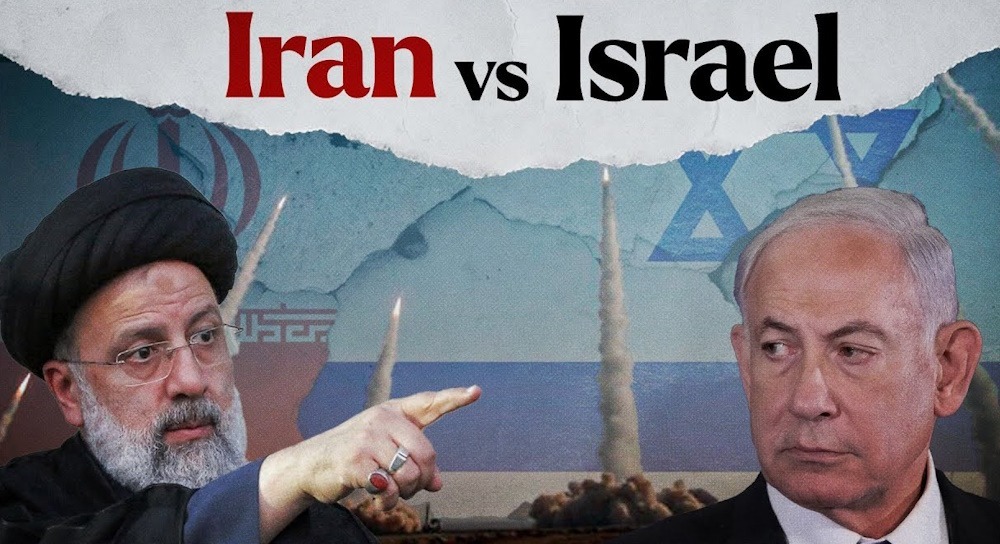Assault by Iran on Israel and its nuclear program.

The recent act by Iran, involving the launch of over 300 missiles and drones, in its initial direct assault on Israeli territory, has shown its willingness to take risks. This has brought attention back to Tehran’s nuclear program and the question of whether it will maintain its restraint in producing a nuclear weapon.
Astute analysts of Iran’s nuclear program have consistently maintained that the country’s highest-ranking officials have strategically determined that the disadvantages of constructing a nuclear weapon surpass the advantages. Iran currently possesses a significant level of deterrence power since it has reached the threshold of nuclear power and has the potential to develop nuclear weapons. This allows Iran to maintain a strong deterrent without risking a potential war that could arise if they were to openly pursue the construction of a nuclear bomb.
However, that notion has been undermined this year. Amid escalating tensions with Israel, high-ranking Iranian officials have made a series of statements implying that Tehran is nearing the point of achieving technical expertise in constructing a nuclear weapon.
Prior to Israel’s retaliatory action, a high-ranking official in Iran’s Islamic Revolutionary Guard Corps stated that Tehran could abandon its self-restraint in developing a nuclear weapon if Israel were to target its nuclear facilities.
Israel’s restrained retaliation targeted areas near Isfahan, where Iran possesses nuclear installations, but refrained from directly assaulting those specific locations.
Raz Zimmt, a senior researcher at the Institute for National Security Studies, suggests that the growing tension between Iran and Israel could potentially bolster Iranian demands for weaponization. Although the advantages of such a shift are currently outweighed by the risks, it is more probable that the Iranian leadership will reassess its nuclear strategy compared to before.
Israel is widely acknowledged to possess nuclear weapons, although it adheres to a policy of neither acknowledging nor denying their existence.
Prior to the recent direct attack, Iran mainly dealt with Israel indirectly through a system of local intermediaries. It has relied on the prospect of involving these militias, particularly Hezbollah in Lebanon, to discourage Israel from taking more forceful actions. According to observers, the reciprocal attacks on each other’s land have intensified the rivalry between the adversaries, as the new rules of engagement become more established.
The inability of Iran to inflict damage on Israeli military installations during the recent attacks may prompt Tehran to pursue a more potent means of deterrence. Zimmt asserts that the difficulties in managing and running the proxy network, which may not always align with Tehran’s goals, might potentially increase the pressure on Iran to develop a nuclear weapon.
Iranian leaders have contributed to this perception by consistently mentioning the country’s advanced nuclear capabilities. During a February interview, Ali Akbar Salehi, a former Iranian Vice President who had a crucial role in Iran’s previous nuclear activities, stated that Iran has successfully surpassed all the significant milestones in nuclear science and technology. These remarks were later reiterated by Mohammad Eslami, the current head of Iran’s atomic agency.
As of March, both U.S. intelligence services and foreign officials have affirmed that they do not believe Iran has restarted its nuclear weapons program, which it was believed to have undertaken during the 1990s and 2000s. However, the nation has made progress in various areas necessary for the development of a nuclear weapon, including research and actions that it claims are related to civilian purposes.
According to David Albright, the president of the Institute for Science and International Security think tank, Iran has the capability to construct a small number of rudimentary nuclear weapons within a timeframe of six months. These weapons could be transported via either trucks or ships.
In 2021, Iran recommenced its efforts to produce uranium metal, a critical component for converting highly enriched uranium into a high-density form necessary for the creation of a nuclear weapon. Additionally, Iran seems to have made advancements in developing the set of high explosives required to trigger a nuclear explosion.
The country’s enrichment program has undergone substantial advancements since the 2015 agreement that imposed limits on its nuclear program. In 2018, President Donald Trump decided to withdraw from the accord. Subsequently, Iran has successfully deployed over 1,000 state-of-the-art centrifuges that operate at a greater speed than its prior equipment in the process of enriching uranium to achieve higher levels of purity.
Tehran has augmented its supply of uranium enriched to 60%, which is close to the level required for weapons-grade material. This stockpile could be swiftly processed to produce enough fuel for approximately three nuclear bombs. Additionally, it has ceased the supervision of certain enrichment facilities, including as the factories responsible for manufacturing centrifuge components, which were formerly monitored by the United Nations atomic agency as part of the nuclear agreement.
The International Atomic Energy Agency has stated that the decrease in visibility could render it unfeasible to determine the number of centrifuges possessed by Iran, thus enabling the development of a clandestine enrichment program.
Concealing an enrichment program would pose a considerable difficulty. Given the presence of permanent IAEA inspectors in Iran, surveillance cameras at its official enrichment facilities, and the close monitoring of Iran’s nuclear activities by Western intelligence services, it would be necessary to equip a covert enrichment site and a concealed conversion facility in order to produce gaseous uranium for enrichment.
However, IAEA Director-General Rafael Grossi said last month that the agency’s limited access to information on Iran’s activities may prevent it from consistently ensuring the peaceful nature of Tehran’s nuclear program.
“I am concerned about my inspectors’ ability to reassemble the jigsaw puzzle,” he expressed.
The repercussions of attempting to construct an explosive device could be extremely grave. President Biden has pledged to prevent Tehran from manufacturing nuclear weapons. Israeli authorities have expressed their intention to employ military measures in order to prevent Iran from developing a nuclear weapon.
If Iran were to acquire rudimentary nuclear weapons or provide proof of a successful clandestine nuclear test, it would probably lead to a global crisis and make a military reaction more complex.
Iran is constructing an intricate system of subterranean tunnels at its Natanz enrichment complex, which serves as a safeguard against potential attacks. Fordow, another facility for enrichment, is located in a subterranean position within a mountain.
Iran’s military vulnerability would persist until it achieves the capability to develop and deploy several dependable weapons suitable for installation on midrange ballistic missiles, which was the initial objective of its previous nuclear weapons program. According to analysts, accomplishing this task could necessitate several years of effort, during which Tehran would need to make an effort to maintain confidentiality.
The recent assault by Iran on Israel has intensified apprehensions regarding its nuclear program.
Iran is making ongoing progress in its development of ballistic missiles. According to Vann Van Diepen, a former U.S. intelligence official, Iran did not incorporate its ballistic missile program with its previous nuclear activities. As a result, the testing of warheads and their components on Iranian missiles remains incomplete.
According to Van Diepen, Iran is not thought to have conducted the necessary vibration and temperature testing to ensure that a weapon would be able to withstand the conditions it would encounter during flight and re-entry into the Earth’s atmosphere.
In the end, the choice to proceed would be driven by political factors. The issue at hand is the specific insights that Iran derives from its recent military confrontation with Israel.
Eric Brewer, a former National Security Council director for counter-proliferation who is now at the Nuclear Threat Initiative, a nonprofit organization, expressed concern that recent events indicate Iran may come to the realization that its current deterrent is insufficient and that it requires nuclear weapons. To the best of our knowledge, the Supreme Leader has not made a decision to develop nuclear weapons. That implies he believes Iran is either not in need of weapons or considers the hazards associated with obtaining them to be excessively great. We should strive to maintain the current state.

